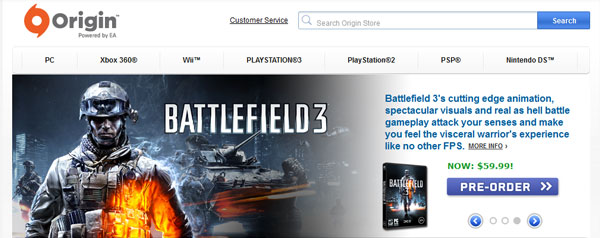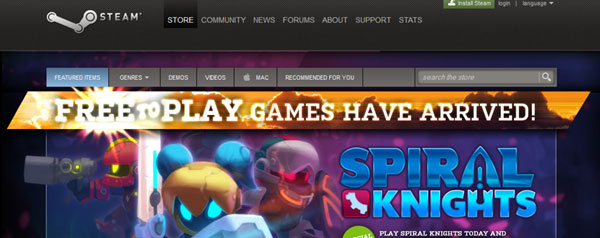I often feel like digital distribution is in the stage of its evolution where it is finally flopping onto land, gasping its first breath of fresh air. That poor creature, still trying to figure out what just happened to it, wondering how to traverse this new dry environment looks up, only to suddenly see and feel some little boy poking it with a stick.
That’s right. Someone got there first, evolved, and is king of the land. That someone is Valve. No matter if you are talking about other digital game distribution services or the wider digital distribution landscape, no one does it better than Steam with its more than 25 million users. Their holiday sales, weekend sales and, now, daily deals, have shown a completely different approach to moving virtual “copies” of entertainment software. Newer games typically go on sale within weeks of launch and only Amazon has managed to keep the banner flying for physical copies. Someone at Valve asked the most important question, “What is the incremental cost of selling one more digital copy?” The answer? “Practically nothing.”

I often ask why no one else has fully grasped the Steam philosophy. Certainly, Direct2Drive, Good ol’ Games, and Impulse are most comparable, but they’re just not there yet. Look at other media, including music, film, and, especially, literary publishing, and you see industries that simply haven’t bothered to even try to investigate what is going on around them. eBooks cost as much or more than paperbacks; music prices have come down, but not enough; and the answer in the film industry was rental rather than ownership, leading to excessive bandwidth usage. Valve is the pioneer. Someday, someone might do it better, but that day has not yet arrived.
It is with this philosophy that I find myself shocked at EA’s reckless decision to remove their highest profile titles including Crysis 2 and Battlefield 3 from Steam and only Steam. Clearly, I am not privy to the intricate relationships between publishers and Steam. It must be extremely complex when dealing with the leading distribution platform when a competing publisher owns that vehicle. Additionally, EA must have made the determination that building and promoting their own platform costs less than the amount they have to cut Valve in on when selling a Steam copy. This might make sense on the bottom line, but as a consumer and Steam user, the business reasons get in the way of my desire to digitally purchase EA titles. EA seems to have forgone the intrinsic value of the purchase, opting simply to use quantifiable metrics.
While EA claims that this is Valve’s doing, I find it hard to believe that the timing is merely coincidental. Even if Valve made the choice to remove those games, it was in reaction to a shot fired from EA’s camp. Valve knows that every Steam copy of a high profile title sold is newly minted money.
I have an EA Store (now Origin) account that I started when Mass Effect 2 was offered for free. I opened a GOG account because they were the only service offering an older game I wanted to play. I have a Games for Windows Live account because they offered Age of Empires III at a ridiculously low price last December. I have a Steam account because the library, user experience, and support are top notch. I’ll visit those other sites if I hear about a deal they are offering, but I visit Steam daily because I know that something is going to be available at a huge discount every single day. I occasionally buy from other places, but I always shop first on Steam.

I am left with two thoughts. First, EA chose to abandon Steam first because they thought it would make the biggest news splash for their Origin service. That battle has been won. Second, EA is looking to build a larger platform to compete with Steam. I suspect the war might be lost.
The reason that Valve got so many publishers on board with Steam is because Valve is everything EA isn’t. They are small and focused. EA, on the other hand, is huge and diverse. Other publishers aren’t going to want to get into bed with EA for distribution on Origin. It’s not worth it to Activision, THQ, 2K and others to fork over traffic to an enormous competitor like EA. The big guys don’t see Valve as a threat. Their impression of EA? Just a bit different.
EA is about to go toe to toe with a behemoth. As nerve-wracking as it must have been for Valve to take such a huge step out of their niche, when they launched Steam, they didn’t have to contend with a crowded market. EA isn’t used to being the underdog. If they don’t start thinking like one, they are destined to fail.

Saint
Valve removed Crysis, not EA
eye-shuh
Yes, Valve removed Crysis because it allegedly violated Valve’s terms of service. It’s unclear exactly how or why that came to pass. I suspect it was something EA did with their own terms of service. It’s also unclear which games EA will be removing. It seems for now they are just pulling future games.
Yesterday I had a really good conversation about this, and I think a good point was hit: when it comes to Steam, you have tons of different publishers competing with each other on pricing. When Steam has a sale, a publisher can either play along and thus get a lot of hits and purchases, or they can keep their game the same price and fall to the wayside. With Origin, EA has no competition and can keep their price point at whatever they want it to be. Also, PC prices are notably cheaper than console prices. EA is a HUGE console publisher. How does it look to gamers when their PC prices are ridiculously lower than console? That hurts their console price point when people turn to PC, and costs them a lot more money than losing PC gamers to Origin, since console games have a cost of production to make up for.
Anyway, I can sort of see why they are doing it. However, I think it’s complete rubbish and that they’ll be crawling on their knees back to Steam once they realize they’ve completely lost their PC market.
Great article! It’s true – Steam paved the way for fair priced digital distribution, and it’s hard for companies to swallow when they think they can be making 1% more money some other way. That was also an excellent point about other publishers not wanting their games on such a huge company’s platform. Which lends more to the suspicion that this ISN’T a Steam competitor at all, but just a marketing ploy by EA to try and squeeze out more cash by charging 60$ for all their PC games for as long as they want.
risk
valve got into steam because of us poor suckers who made it for them.
Counter-Strike 1.6. If you wanted to play it you had to upgrade, and upgrade we all did. You all know steam for what it is now, rewind 5 years and 2 years after launch and friends never worked. it was a gaping pile of shit.